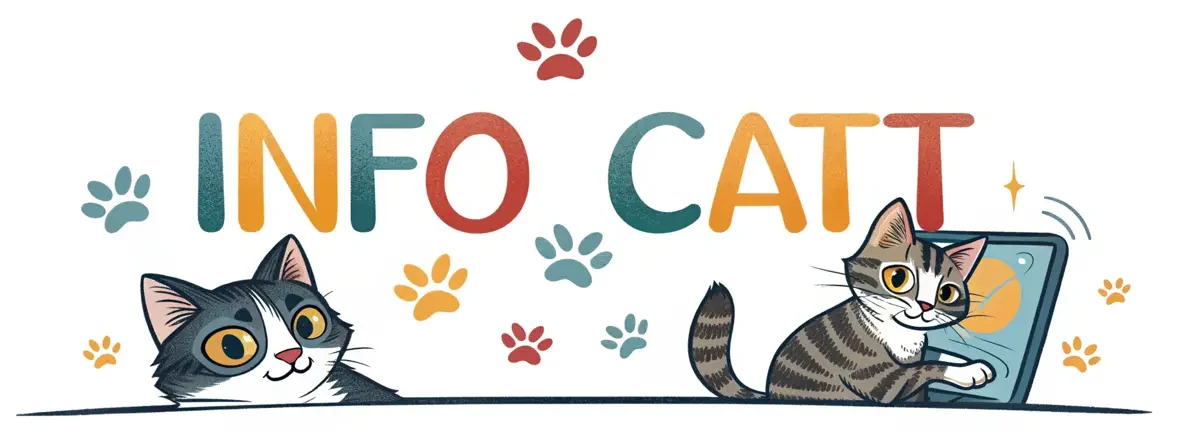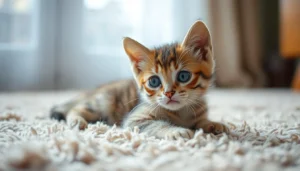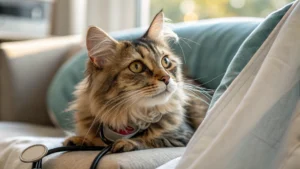Watching your cat grow is a special feeling. But, what if your cat isn’t growing like others? This can be a big worry and a mystery.
Many cat owners wonder why their cat isn’t growing right. If your kitten isn’t getting to the expected size or your young cat is smaller than others, you’re not alone. This is a common concern.
There are many reasons why a cat might not grow as expected. These include what they eat, their genes, and health issues. Spotting these problems early and knowing what might cause them is key to keeping your cat healthy and growing right.
Understanding Normal Cat Growth and Development Stages
Every cat owner wants their pet to grow healthy and strong. Knowing your cat’s growth journey is key. It helps you track their development and spot issues early. Cats grow differently than other pets, so it’s important to understand their growth patterns.
Tracking your cat’s growth involves several key considerations. A healthy cat weight chart is very helpful. It lets you know if your cat is growing as they should.
Growth Milestones From Kitten to Adult Cat
Cat development is fast in the first year. Here are some important growth milestones:
- 0-2 weeks: Completely dependent on mother
- 2-8 weeks: Rapid physical and social development
- 8-16 weeks: Active exploration and learning
- 4-6 months: Significant growth and sexual maturation
Average Weight and Size by Age
When do cats stop growing? Most cats reach their full size between 12-18 months. Different breeds grow at different rates. Here’s a general weight guide:
- Kittens (2-4 months): 2-4 pounds
- Juveniles (4-6 months): 4-8 pounds
- Adults (1-3 years): 8-10 pounds for females, 10-12 pounds for males
“Every cat is unique, and growth can vary significantly between individuals and breeds.” – Veterinary Nutrition Experts
When Do Cats Stop Growing?
Most domestic cats finish growing by 18 months. Larger breeds like Maine Coons may grow until 3-5 years old. Regular vet visits help track your cat’s growth and address any concerns.
Why Is My Cat Not Growing: Common Causes and Concerns
It can be tough for pet owners to figure out why their kitten isn’t growing. Seeing a small cat for its age can make you worry about health problems. There are many reasons why your kitten might not be gaining weight or growing as fast as it should.
Some common reasons for slow growth include:
- Parasitic infections that drain nutrients
- Poor nutritional intake
- Genetic predispositions
- Underlying medical conditions
Parasites can really affect a kitten’s growth. Worms and other parasites eat nutrients that your cat needs. This can cause your kitten to not grow as it should, leading to a why is my kitten so small problem that needs vet help right away.
“Early detection of growth issues is crucial for your kitten’s long-term health” – Veterinary Nutrition Experts
Nutritional problems are also key in kitten development. If your kitten doesn’t get enough protein, vitamins, or minerals, it can grow very slowly. They need a diet made just for young cats to grow right.
Stress from the environment can also slow growth. Things like too many cats, not enough mom care, or constant changes can hurt a kitten’s growth chances.
Nutritional Factors Affecting Your Cat’s Growth
Proper nutrition is key for your cat’s growth. Knowing what to feed an underweight cat can greatly improve their health. Cats need a balanced diet that meets their unique needs at each stage of life.
Kittens and growing cats need certain nutrients for muscle, bone, and organ development. To help your kitten grow well, focus on high-quality protein and essential vitamins.
Essential Nutrients for Proper Development
Key nutrients for optimal cat growth include:
- High-quality animal protein
- Taurine for heart and eye health
- Calcium and phosphorus for bone development
- Omega-3 fatty acids for brain and coat health
Signs of Nutritional Deficiencies
Watch for these warning signs of nutritional problems:
- Dull or patchy coat
- Slow growth
- Lethargy
- Frequent illnesses
Choosing the Right Food for Growth
When picking food for an underweight cat, choose age-appropriate, nutrient-rich options. Kitten-specific formulas are best for young cats, offering the right nutrition for growth.
Consult your vet to create a nutrition plan tailored to your cat’s growth needs. This will help them reach their full potential.
Medical Conditions That Can Stunt Cat Growth
Cat growth problems can come from many medical conditions. These issues can stop your cat from growing as they should. It’s important to know about these health problems to help your cat grow fully.
Along with slow growth, excessive meowing can signal distress or an underlying problem—here’s why your cat might be meowing so much.
Parasitic infections are big cat growth problems. Worms, for example, can slow down your cat’s growth. They take nutrients from your cat’s food, making it hard for them to grow.
- Roundworms: Can reduce nutrient absorption
- Hookworms: Cause blood loss and malnutrition
- Tapeworms: Interfere with nutrient uptake
Chronic diseases can also stop your cat from growing. Problems like feline leukemia virus (FeLV), kidney disease, and thyroid disorders can affect growth. These issues can mess with how your cat’s body works, making it hard to grow.
Hormonal imbalances are another big factor in cat growth problems. Issues with the pituitary gland or thyroid can really slow down growth. Early detection and professional veterinary intervention are key to managing these complex health challenges.
Regular veterinary check-ups can help identify and address potential growth-related medical conditions before they become serious.
If you think your cat is having growth issues, see your vet right away. They can run tests to find out why and help your cat grow healthy.
Genetic and Breed-Specific Growth Patterns
Understanding why your 6-month-old kitten is still small often points to genetics and breed traits. Each cat breed has its own growth pattern. This affects their size and how they develop.
Cat genetics are key in determining size and growth potential. Some breeds stay smaller, while others grow more quickly.
👉 Understanding Breed Size Variations
Different cat breeds show amazing size differences because of their genes. For example:
- Siamese cats are lean and medium-sized
- Maine Coon cats can grow quite large
- Singapura breed is very small
👉 Inherited Growth Issues
Genetics can lead to growth problems in kittens. Some inherited conditions can slow down or limit growth. Possible issues include:
- Dwarfism
- Genetic mutations affecting growth hormones
- Chromosomal abnormalities
“Genetics is like a blueprint for your cat’s growth journey” – Veterinary Geneticist
👉 Mixed Breed Growth Expectations
Predicting growth in mixed breed cats is more complex. Your kitten’s size might show a mix of their parents’ genes. Watching your cat’s weight and talking to a vet can help understand their growth.
Remember, every cat is unique, and variation is completely normal.
When to Seek Veterinary Help for Growth Issues
Watching your cat’s growth is key to their health. Knowing when to see a vet is important to avoid health problems. Look out for signs that mean it’s time for a vet visit.
Don’t ignore signs of an underweight cat. These signs mean you need to see a vet:
- Consistent weight loss or failure to gain weight
- Visible ribs or spine with minimal body fat
- Reduced appetite lasting more than 24 hours
- Significant changes in eating or drinking habits
- Lethargy or decreased energy levels
Kittens need extra care during their growth. If your kitten isn’t growing right, a vet can find the problem. Early intervention is key to addressing growth challenges.
Professional veterinary assessment can identify and treat growth-related concerns before they become serious health problems.
Your vet will do a full check-up. This might include blood tests, nutritional checks, and more to find why your cat isn’t growing.
Tips for Supporting Healthy Cat Growth and Development
Helping your kitten grow right needs a full plan. This plan covers food, home, and care. Every cat is different, but some key steps help a lot.
For your cat to grow strong and healthy, many things must work together. To start, make a caring home and give the right food.
👉 Crafting the Perfect Feeding Schedule
Choosing the right food for an underweight cat is key. A regular eating schedule is crucial for your kitten’s growth:
- Feed kittens smaller, frequent meals 3-4 times daily
- Use high-quality kitten-specific food with balanced nutrients
- Gradually transition to adult food around 12 months
- Monitor portion sizes based on age and weight
👉 Growth-Supporting Nutritional Supplements
Some kittens might need extra nutrients. Consult your veterinarian before adding any supplements. This ensures they fit your cat’s needs.
👉 Creating an Optimal Growth Environment
Home factors greatly affect your kitten’s growth. Think about these to help your kitten grow well:
- Provide a stress-free living space
- Ensure regular play and exercise
- Maintain consistent feeding and sleeping routines
- Regular veterinary check-ups
Remember, each cat is unique. Personalized care and attention are key to supporting your kitten’s healthy growth journey.
Conclusion
Figuring out why your cat isn’t growing can be tricky. It involves many factors like diet and genetics. Watching your cat closely and getting help from vets is key.
Early action is important when your cat’s growth is slow. Regular vet visits, good food, and watching your cat can help. Every cat grows differently, so don’t compare too much.
Genetics, breed, and health issues all affect how cats grow. Working with vets and staying informed helps a lot. It’s about more than just size; it’s about your cat’s health and happiness.
Being patient and knowing what to do helps with cat growth issues. Taking care of your cat’s needs means they can live a happy, healthy life.
FAQ
Why does my kitten seem smaller than other kittens of the same age?
Several things can make a kitten seem smaller. Genetics, nutrition, health, and breed can all play a part. Some cats are naturally smaller, while others might not grow right because of health or diet issues.
At what age do cats typically stop growing?
Cats usually stop growing between 12 to 18 months. But, bigger breeds like Maine Coons might keep growing until they’re 3-5 years old. Their size and growth speed depend on their genes and breed.
How can I tell if my cat is underweight?
Look for signs like visible ribs, a clear waistline, and less muscle. You can also use a vet’s weight chart to check your cat’s weight. If you’re worried, always talk to a vet for a professional check.
Can worms affect my cat’s growth?
Yes, worms can really hurt your cat’s growth and health. They stop your cat from getting the nutrients they need, leading to malnutrition and weight loss. Keeping up with deworming and vet visits is key to your cat’s health.
What should I feed an underweight cat?
Feed your underweight cat high-quality, protein-rich food. Wet food or kitten formulas with more calories are good choices. Your vet might suggest special formulas or supplements to help your cat gain weight safely.
When should I be concerned about my cat’s growth?
See a vet if your cat grows slowly, loses a lot of weight, is very tired, or eats less. Early help can catch and fix health problems before they get worse.
Do different cat breeds grow at different rates?
Yes, they do. Large breeds like Maine Coons grow slower and take longer to reach their full size. Smaller breeds like Singapura grow faster. Knowing your cat’s breed can help you understand their growth.
How important is nutrition in supporting my cat’s growth?
Nutrition is very important for your cat’s growth. A balanced diet with the right protein, vitamins, and minerals helps with muscle and bone growth. Talk to your vet to make sure you’re feeding your cat the right food for their age and health.



